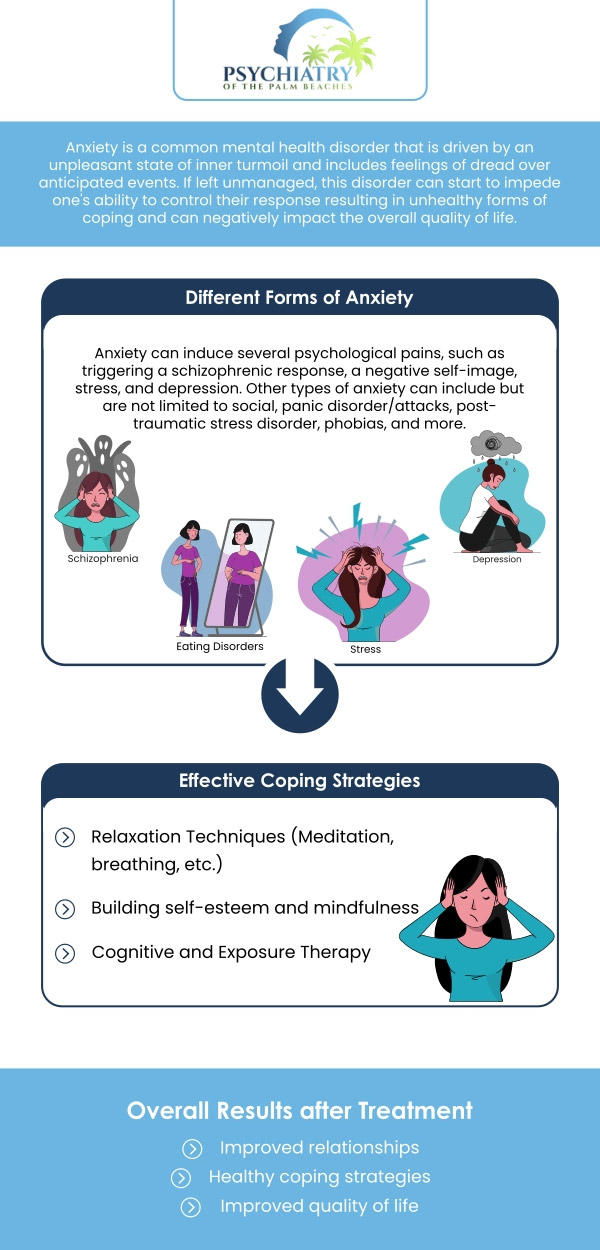Checking Out Different Approaches in Counselling for Stress And Anxiety Problem for Long-term Adjustment
When tackling stress and anxiety disorders, it's necessary to discover a range of therapy approaches. Each approach provides unique insights and devices to assist you handle your symptoms effectively. You may discover that incorporating techniques can yield the most effective outcomes. Understanding the nuances of these methods is key to fostering long-term change. Suppose the right combination could release a brand-new level of emotional well-being for you?
Understanding Anxiety Conditions: A Brief Summary
Anxiousness problems, which impact countless individuals worldwide, can greatly impact day-to-day life. You may experience frustrating sensations of anxiety or worry that seem irrepressible. These feelings can result in physical symptoms like an auto racing heart, sweating, or perhaps lightheadedness. Common kinds of anxiousness conditions consist of generalised anxiousness problem, panic attack, and social anxiety problem. Each has distinct signs, but they all share a tendency to disrupt your routine and relationships.Understanding the root creates of your anxiousness is important. It could stem from genetics, mind chemistry, or life experiences. Recognizing your triggers can help you handle your actions much better. It is essential to keep in mind that you're not the only one in this struggle. Lots of people deal with similar obstacles, and seeking aid is a strong step towards feeling much better. By discovering anxiety disorders, you're currently on the path to understanding and managing your problem better.
Cognitive-Behavioral Treatment: Challenging Negative Thought Patterns
In Cognitive-Behavioral Treatment, you'll begin by recognizing the unfavorable thought causes that add to your anxiety. Counseling services for anxiety. When you identify these thoughts, you'll service replacing them with even more positive choices. Together, you'll develop reliable coping approaches to assist manage your anxiety in everyday circumstances

Identifying Negative Thought Triggers
When you encounter minutes of distress, acknowledging the specific triggers behind your adverse thoughts can be important in handling anxiousness. Begin by taking note of circumstances that provoke sensations of worry or concern. Is it a crowded room, a future due date, or a conversation with particular individuals? Write these instances in a journal. This will aid you recognize patterns in your thinking. Notification physical experiences that accompany your adverse ideas, like a racing heart or rigidity in your upper body. By determining these triggers, you obtain insight right into what's sustaining your anxiety. Recognizing these connections is the initial step in testing those ideas and inevitably gaining back control over your emotional responses.
Changing Ideas With Positives
Testing adverse thought patterns is an essential step in transforming your mindset and reducing anxiety. You may typically find yourself entraped in cycles of insecurity or tragic thinking. Rather than letting these ideas dictate your sensations, technique changing them with positive affirmations or sensible alternatives. For circumstances, when you assume, "I can't handle this," change it to, "I can handle obstacles one step each time." This straightforward modification can considerably influence your mood. On a regular basis determining and countering these unfavorable ideas assists develop a healthier interior discussion. Remember, it takes time and initiative, yet consistently practicing this strategy can cause long lasting adjustment, equipping you to encounter anxiety with renewed confidence and resilience.
Building Coping Methods With Each Other

Mindfulness and Acceptance-Based Approaches: Cultivating Present-Moment Recognition
As you navigate the intricacies of anxiousness, incorporating mindfulness and acceptance-based techniques can considerably enhance your ability to grow present-moment understanding. By concentrating on the present moment, you'll locate that you can observe your ideas and feelings without judgment. This method aids you acknowledge your anxiousness without really feeling overwhelmed by it.Engaging in mindfulness exercises, such as deep breathing, body scans, or directed reflections, permits you to ground yourself in your present experience. Acceptance-based strategies urge you to embrace your emotions instead of fight against them. They shed their power over you.Incorporating these techniques right into your daily routine can transform how you react to anxiety when you approve your sensations. You'll create resilience and learn to browse demanding situations with greater ease. Ultimately, cultivating present-moment understanding lays the foundation for lasting adjustment, empowering you to lead a much more fulfilling life.
Direct Exposure Treatment: Challenging Fears Gradually
Exposure therapy assists you face your anxieties in a gradual means, making it less frustrating. You'll discover techniques to encounter anxiety-provoking scenarios detailed, while likewise building coping methods to handle your reactions (Counseling services for anxiety). This technique empowers you to take control and minimize anxiousness over time
Gradual Exposure Strategies
When encountering stress and anxiety, slowly challenging your fears can be a powerful method to regain control. This technique, referred to as progressive exposure, involves slowly exposing yourself to the situations or things that cause your stress and anxiety. Beginning with less intimidating scenarios and progressively work your method approximately more challenging ones. If you're afraid of public talking, you may start by speaking in front of a mirror, then progress to sharing ideas with a close friend, and at some point attend to a tiny team. Each step assists desensitize you to the anxiety, constructing your self-confidence in time. Remember, it's crucial to rate yourself and commemorate little victories as you move through this procedure, enhancing your ability to handle stress and anxiety successfully.
Structure Coping Methods
Building reliable coping strategies is important for taking care of anxiousness, particularly as you confront your concerns slowly. One powerful method is direct exposure therapy, where you start by facing your anxieties in a regulated way. Begin with less frightening scenarios and slowly work your method as much as more difficult situations. This steady direct exposure helps desensitize you to stress and anxiety causes, making them much less overwhelming.Incorporate relaxation methods, such as deep breathing or mindfulness, to relax your mind during direct exposure. Track your progress, celebrating small triumphes in the process to increase your confidence. Keep in mind, it's all right to take your time; the objective isn't perfection however consistent improvement. By developing these methods, you'll encourage yourself to navigate stress and anxiety and embrace life more fully.
Psychodynamic Therapy: Revealing Origin Causes of Stress And Anxiety
Psychodynamic therapy checks out the unconscious mind, exposing the source of your anxiousness. By examining your ideas, sensations, and previous experiences, this method helps you uncover underlying disputes and unsettled problems that may contribute to your existing anxiety. You'll deal with a therapist to examine childhood experiences, relationships, and psychological patterns that form your actions today.As you obtain understanding right into these deeper layers of your psyche, you'll start to identify how past events influence your present actions. This understanding can bring about catharsis, enabling you to process emotions you may have suppressed.Through the therapeutic partnership, you can additionally recognize protection systems that might have created in time, supplying a more clear path to alter. Ultimately, psychodynamic treatment equips you with the tools to resolve your anxiety at its core, advertising long-term transformation in your psychological well-being.
All Natural and integrative Techniques: Integrating Techniques for Greater Efficacy
Integrating numerous therapeutic techniques can enhance your trip toward managing stress and anxiety more effectively (Counseling services for anxiety). By incorporating components from cognitive-behavioral treatment, mindfulness practices, and holistic techniques, you can produce a customized strategy that resolves your unique requirements. As an example, you could use cognitive-behavioral techniques to test adverse idea patterns while integrating mindfulness workouts to ground on your own in the present moment.Additionally, discovering holistic techniques such as yoga exercise or reflection can advertise relaxation and reduce anxiety signs and symptoms. This blend permits you to create greater self-awareness and resilience.Experimenting with these varied methods can aid you uncover what reverberates most with you. Bear in mind, it has to do with finding a harmony that works, instead of sticking to a solitary method. This integrative approach not just provides instant alleviation but additionally fosters long-lasting skills for handling anxiousness, equipping you to recover control over your life

The Role of Assistance Systems: Building Durability With Connection
While it may appear that managing anxiousness is a solitary journey, having a solid support group can play an essential role in your resilience. Bordering yourself with compassionate close friends, household, or support groups produces a secure room where you can honestly share your experiences and sensations. When you get in touch with others, you remind on your own that you're not alone in this struggle.These connections supply support and can supply useful coping techniques that have actually helped others. It's also a possibility to obtain viewpoint; buddies can aid you see scenarios in a different way, decreasing feelings of isolation.Moreover, psychological support promotes a feeling of belonging, which can substantially ease anxiety symptoms. By leaning on your assistance system, you can develop durability and deal with obstacles Home Page better. Bear in mind, connecting for aid is an indicator of toughness, and it can make all the difference in your trip towards taking care of stress and anxiety.
Often Asked Concerns

What Are the Typical Signs And Symptoms of Stress And Anxiety Disorders?
You may experience restlessness, tiredness, difficulty concentrating, impatience, muscle mass stress, and sleep disturbances. Physical symptoms can consist of rapid heartbeat, sweating, and trembling. Identifying these indicators early can aid you seek ideal support and treatment.
The Length Of Time Does Treatment Normally Last for Anxiousness Disorders?
Treatment for anxiousness problems usually lasts anywhere from a few weeks to numerous months. It actually depends upon your specific requirements, progression, and the strategies your specialist uses to aid you manage your anxiousness successfully.
Can Medicine Be Utilized Alongside Therapy for Anxiety?
Yes, drug can certainly be made use of together with therapy for stress and anxiety. Combining both strategies frequently enhances therapy efficiency, helping you take care of signs and symptoms while checking out underlying issues through therapy. Always consult your doctor for customized guidance.
Exist Self-Help Strategies for Managing Anxiety?
Yes, there are numerous self-help approaches for managing stress and anxiety. You can practice mindfulness, engage in routine exercise, maintain a well balanced diet regimen, establish a regular, and make use of deep breathing techniques to aid decrease anxiety symptoms efficiently.
How Do I Know if I Required Professional Aid for Anxiety?
You ought to take into consideration seeking professional aid for stress and anxiety if it interferes with every day life, causes significant distress, or if self-help techniques aren't functioning. Trust fund your impulses; getting to out can cause far better coping abilities and support. Usual kinds of anxiety conditions include generalised anxiousness disorder, panic problem, and social anxiousness condition. When you come across moments of distress, identifying the particular triggers behind your adverse ideas can be crucial in managing stress and anxiety. Replacing unfavorable ideas is only the start of managing anxiety successfully. By analyzing your thoughts, feelings, and previous experiences, this strategy assists you reveal underlying conflicts and unsettled concerns that might add to your existing anxiety. It's likewise an opportunity to get viewpoint; pals can help you see scenarios differently, lowering sensations of isolation.Moreover, emotional support cultivates a sense of belonging, which can substantially alleviate anxiousness signs and symptoms.